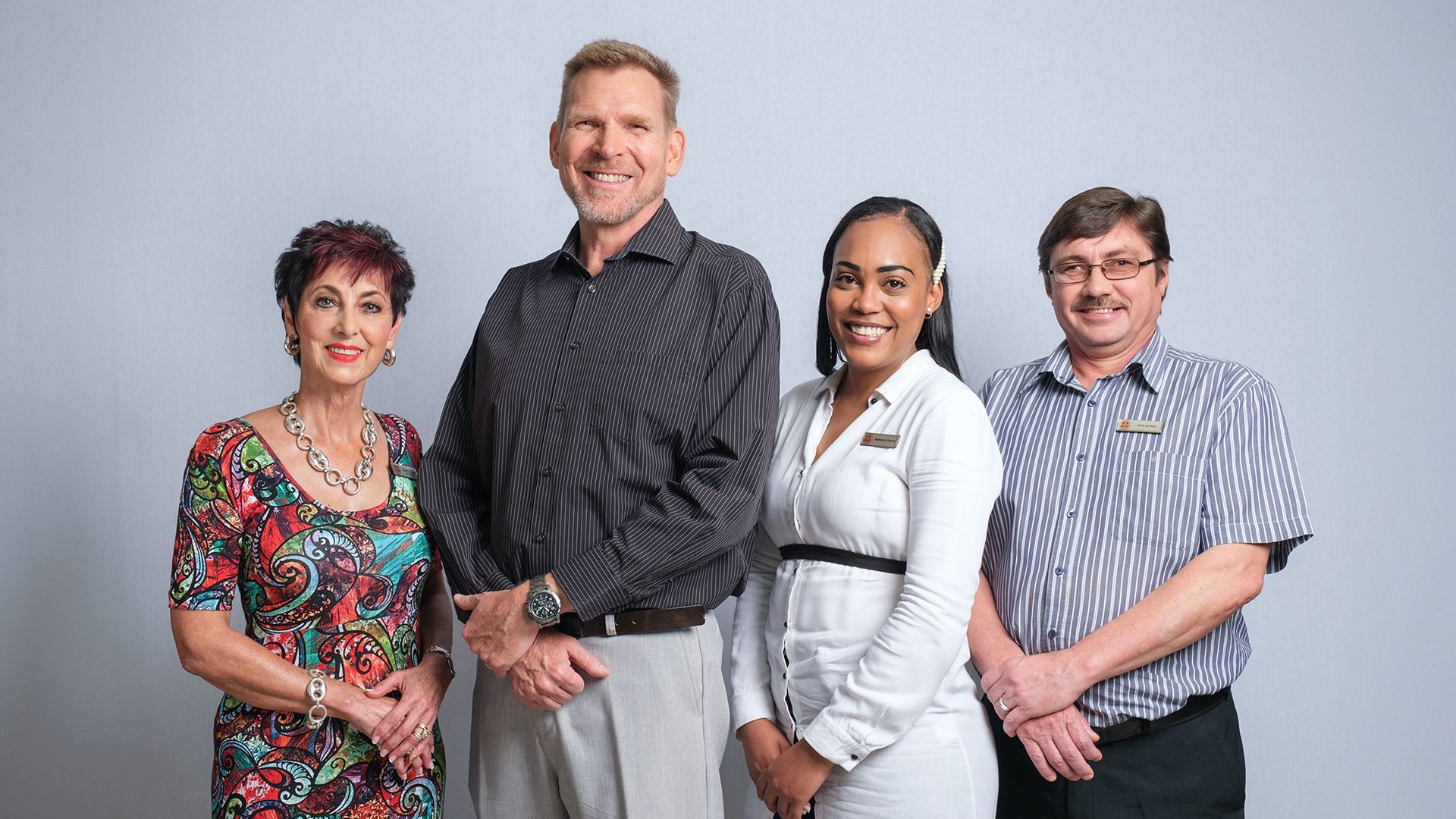The pulse of the community
(Left to right) Netcare Medicross Constantia Park clinic manager Estelle Claassen is pictured with General Practitioner Dr Nico Claassen and receptionists Algereece Damon and Christiaan de Beer.
Netcare Medicross celebrates 30 years of service
For 30 years Netcare Medicross and the healthcare professionals practising at its medical and dental centres have become part of the beating heart and rich tapestry of familiar community life, often serving multiple generations of the same family.
Dr Nico Claassen was one of the founding general practitioners when Netcare Medicross Constantia Park first opened its doors on 4 December 1994 and over this time, he has seen patients he first met as young couples become parents and then grandparents – with three generations under his care.
“Although the layout has changed so much since the beginning that it is hardly recognisable, one thing that has not changed is the wonderful team spirit and rapport between the doctors and staff, which is also reflected in the care for our patients,” Dr Claassen says.
“It is a privilege to have earned the trust of so many patients and a great responsibility. Once they have been to a specialist, many patients value our support and advice in following their treatment or management plan. It is very heart-warming, and I feel such gratitude for the relationships we have built over time.”
Mrs Tinkie Loubser has been a patient of Dr Claassen’s for 27 years, having previously worked in the dentists’ rooms at Netcare Medicross Constantia Park. “One day, 21 years ago, I consulted Dr Claassen because I started having trouble with my facial nerves,” she says.
“The following week, the doctor asked how I was feeling, and since my condition had not improved, he booked me an appointment with a neurologist. At first, I thought it was a waste of time – but the neurologist discovered I had a massive brain tumour.
“Dr Claassen was as caring and supportive as ever, he prescribed something to calm my nerves after the shock of the diagnosis and helped me to book the neurosurgeon, who saved my life by removing the brain tumour. I will always be thankful that I was diagnosed in time.”
Mrs Loubser, her husband, children and grandchildren have all been patients of Dr Claassen and the other doctors of Netcare Medicross Constantia Park in Pretoria. “He has always been good to us and supported us through so many things. Netcare Medicross has become part of our lives. Even though we live in the city, it feels more like small town care because they know you, you aren’t just a number to them.”
Mrs Sandra Fichardt has been Dr Claassen’s patient for 25 years since she was a student. “He is not your typical doctor sitting across the desk, he is also a human being. It comes naturally to him to ask about your family, and how you are feeling – apart from just asking about your clinical symptoms.
“He has seen us through so much; our children are about the same age, and we went through the ‘teenage years’ as parents at the same time, and as a medical doctor, he provided excellent support and referrals through the years.
“Dr Claassen and the other doctors we have been to at the Medicross centre have been good to us, and it is rare to be kept waiting. I also appreciate that he is mindful of our medical scheme benefits and does not prescribe unnecessarily, especially when it comes to antibiotics,” Mrs Fichardt says.
Dr Neville Wellington has been practising at Netcare Medicross Kenilworth for 29 years, and during this time he has seen patients he treated as children grow up and have their children under his care. “The beauty of being in general practice is that you have a long-term relationship with your patients,” he says.
“I started at Medicross on 7 April 1994, and so much has changed since then in terms of the building and the technology we now have. We have grown from three doctors then to 14 doctors now and from one dentist to six to match the needs of the community.”
The addition of a nursing department proved lifesaving for a patient who came in early one morning complaining of chest pains during the early stages of the COVID-19 pandemic. Nurses were performing an electrocardiogram (ECG) when Dr Wellington arrived to find the patient starting to go into cardiac arrest.
“Fortunately, we have an automatic defibrillator, and we resuscitated the man immediately and placed him on a drip while waiting for the ambulance to transfer him to hospital, and I could brief the cardiologist before the patient arrived so all would be ready to receive him. Thankfully, he was in the right place at the right time when this happened, and he survived and made a good recovery,” Dr Wellington recalls.
Dr Billyy van der Merwe, managing director of Netcare’s primary health division, thanked all healthcare professionals practising at Netcare Medicross facilities, practice management and staff members for their partnership and dedicated service to patients over the past three decades.
“Most of all, we are grateful to the individuals and families who turn to our Netcare Medicross facilities at the heart of their communities for their medical and dental needs. We will continue to invest in the services that make healthcare more convenient so you can always feel at home while looking after your health at your local Medicross,” Dr Van der Merwe concludes.













